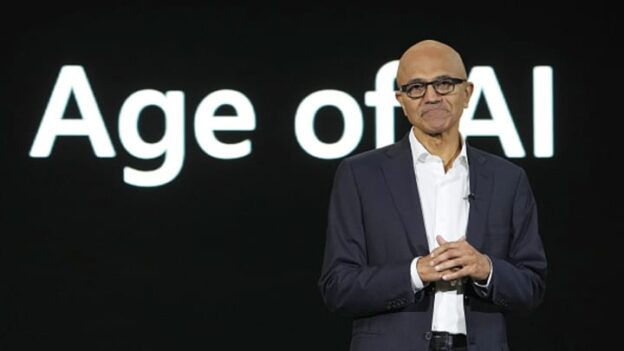Satya Nadella calls for AI to reduce administrative burdens on clinicians, enabling them to focus on patient care. Know how Microsoft’s AI can transform healthcare
Microsoft CEO Satya Nadella has highlighted the crucial need to reduce administrative burdens on healthcare professionals, advocating for the use of AI to streamline tasks and allow doctors and nurses to focus on what matters most: patient care. In a recent LinkedIn post, Nadella emphasised that clinicians enter the profession to heal, not to drown in paperwork.
This “paperwork pandemic” has several detrimental effects:
- Reduced Patient Interaction: Time spent on paperwork directly reduces the time clinicians can dedicate to patient consultations, examinations, and care planning.
- Increased Burnout: The relentless administrative workload contributes to stress, fatigue, and burnout among healthcare professionals, leading to decreased job satisfaction and higher turnover rates.
- Lower Quality of Care: When clinicians are overwhelmed with administrative tasks, the quality of patient care can suffer, leading to potential errors and suboptimal outcomes.
- Higher Healthcare Costs: Inefficient administrative processes contribute to rising healthcare costs, as resources are diverted from direct patient care to managing paperwork.
Microsoft is actively investing in AI-powered solutions for the healthcare sector. These technologies include natural language processing (NLP) for automated documentation, machine learning for predictive analytics, and cloud-based platforms for secure data sharing and collaboration. By partnering with healthcare providers and organisations, Microsoft aims to accelerate the adoption of AI and drive meaningful improvements in patient care.
Nadella champions the use of Artificial Intelligence (AI) to automate many of these time-consuming administrative tasks, freeing up clinicians to focus on their core competencies. AI can assist with:
- Documentation: AI-powered systems can transcribe patient consultations, automatically generate medical notes, and populate electronic health records (EHRs), reducing the burden of manual data entry.
- Billing and Coding: AI can automate the complex processes of medical billing and coding, ensuring accuracy and efficiency while reducing errors and delays.
- Analytics: AI can analyse patient data to identify potential health risks and predict future healthcare needs, enabling proactive interventions and preventative care.
- Workflow Optimisation: AI can optimise clinical workflows, streamlining processes and reducing bottlenecks to improve efficiency and coordination.
Join TBC’s WhatsApp Channel to Stay Updated!
https://www.thebridgechronicle.com/amp/story/tech/ai-healthcare-satya-nadella-paperwork-burden





